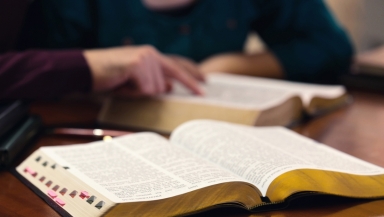
I'm sure you share my horror at the dreadful corrosive substance attack last week on a woman and her two young children. Our prayers remain with the three of them.
Abdul Ezedi, an Afghan national, has been named as a suspect by the police. It's since been revealed he was granted UK asylum on his third attempt, after having been convicted of sex offences committed in the UK, and being placed on the sex offenders' register.
There will of course be a police investigation, and the public are privy to very few details.
However, for some politicians and much of the media, the concern has – strangely – not been about how the criminal justice system responds to – and indeed prevents – violence against women and children.
Instead they have focused on Ezedi's conversion to Christianity, and have sought to lay the responsibility for his dreadful attack at the doors of the church – either for being naïve enough to be duped by 'bogus' conversions, or else for intentionally conspiring to keep people in the UK when they have no right to be here.
This has reignited a debate around whether the church should be opening its doors to asylum seekers and supporting them to find Christ. I wrote about this in relation to the attempted terror attack in 2021 in Liverpool by another Christian convert.
Firstly let's make absolutely clear that it is the Home Office and the courts, and not the church, who are responsible for accepting or rejecting asylum claims. Church leaders may provide evidence that someone has regularly attended and made a profession of faith. But they do not judge whether that faith is genuine, any more than for a middle class family seeking to get their child into the local church school.
Declarations of conversion are rigorously tested by those considering asylum applications, and the bar is high. Indeed many genuine asylum seekers report an innate disbelief from the authorities surrounding faith claims.
And let's also remember that conversion to Christianity from another faith should not be seen as an easy option. There is often a huge cost to the individual. Converts may be treated with hostility or rejected by other asylum seekers from their own country – who may be the only people here that they know. Converts have to be very careful about sharing testimonies and may have to hide from their own families, as the danger of retribution can be very real. I refer you to last week's conversation with Gareth Wallace about the persecution of Christians worldwide.
On top of this, members of their new churches might believe the shrill media commentary and reject them as fake believers.
So the risks for individuals are high. And the courts and Home Office need to take into account the risks of harm towards a genuine convert being sent back to a country hostile to their new faith.
The politicians and journalists who point the finger at the church surely know all this, though, so why is the church being so fiercely accused of "facilitating industrial-scale bogus asylum claims" (in the words of Suella Braverman)?
Of course there will be some fake conversions, and the church should be alert to the fact that people do try to game the system. But who other than God can decide who has genuinely accepted Christ in their hearts and who has not?
At the heart of this debate is a tussle over what it means to be human.
God's invitation is open to all – no matter where you come from or what you have done. If we believe that each human is made in God's image, this means each one of us is valuable to him. No exceptions.
And it means that our human rights spring from this innate value. Freedom of religion or belief is a fundamental right. And so it is a massive contradiction to say on the one hand that we should be a Christian country – with laws and traditions based on Christian values – but also to deny some people the protection of gospel-inspired humans rights laws, because it suits a political agenda.
Of course the church should continue to proclaim the Christian faith and not be derailed by this row. Sharing Christ's love and grace is our main responsibility.
Jesus spent time with those who were rejected by his society – "tax collectors and sinners" – and so we should expect his church to do the same. We should rejoice that some of the asylum seekers on the Bibi Stockholm barge are reported to have to turned to Christ with the support of local churches. If we lazily assume these are all fake, we deny the power of the Gospel message.
If this latest development in the culture wars leads to the church being urged to close its doors to any group of people, that would amount to the church being directed to abandon Christ's Great Commission to "make disciples of all nations" (Matthew 28:19). Gently but firmly I say that this is a direction that we cannot follow and still be considered faithful. Let's instead be bold and pray that more refugees will genuinely respond to the Gospel this year.
Tim Farron has been the Member of Parliament for Westmorland and Lonsdale since 2005, and served as the Leader of the Liberal Democrat Party from 2015 to 2017.Tim is also the host of Premier's 'A Mucky Business' podcast. His new book A Mucky Business: Why Christians should get involved in politics is published in November.













